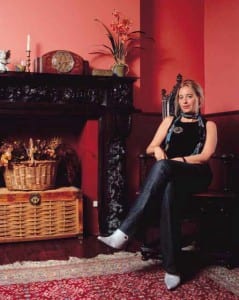Noreena Hertz: The Complexity of Decision-Making
By ucyow3c, on 29 January 2014
![]() Written by Nicholas Tyndale, Communications Director, Office of the UCL Vice-Provost (Research)
Written by Nicholas Tyndale, Communications Director, Office of the UCL Vice-Provost (Research)
In her inaugural lecture, The Complexity of Decision-Making, UCL Honorary Professor Noreena Hertz discussed how to improve decision-making, manage information excess, assess the credibility of information and make the best use of advice.
Professor Hertz shared six insights from her latest book, Eyes Wide Open: How to make smart decisions in a confusing world, which draws on academic research and extensive interviews with “the smartest decision-makers”:
1. We need to take experts off their pedestals. We cede our decision-making power to experts too easily and uncritically, yet experts get a lot of decisions, judgements and predictions wrong. We need to understand our own cognitive biases (as should experts understand their own).
2. We need to become better information gatherers. There is valuable lay expertise and local knowledge that is too often untapped. Employees tend to make better predictions about their organisation than those in management. Sources such as Google Trends and crowd-sourcing can provide a “truer narrative” – for example, about housing markets or pandemics – than official sources. Yet we should treat new sources of information with discretion.
3. We need to seek out difference and dissent. We are prone to surrounding ourselves with the similar and the familiar, but research shows that diverse groups make smarter and more innovative decisions. We are rewarded with a rush of dopamine upon receiving information that confirms a belief or hope, but we should seek to expose ourselves to discordant, divergent views. Find a “challenger-in-chief”: the cut and thrust of debate produces better insights.
4. We are not the ‘rational decision-makers’ of economic theory. Our emotional state and physical condition influence the quality of our decisions. In particular, hunger and lack of sleep inhibit a balanced consideration of issues, while visual stimuli influence have been shown to influence the optimism of predictions.
5. We need to be aware of our own expectations. Too often, we expect events and trends to follow a linear projection. Many businesses fail because they stick to “what works”; in a fast-moving world, what was effective or popular yesterday may not be so tomorrow.
6. We need to carve out time and space to think. Very few people reserve at least 30 minutes per day for thinking. We are slaves to our electronic devices – and they distract us from what is important by offering us what is new.
With our eyes wide open and our brains switched on, Professor Hertz concluded, we can greatly increase the odds of making better predictions and decisions.
Professor Hertz, a 1997 graduate of UCL Economics and Philosophy at the age of 19 and an Honorary Professor in the Office of the UCL Vice-Provost (Research), is author of a range of books and articles on economic, geopolitical and business issues, such as I.O.U.: The debt threat and why we must defuse it; The Silent Takeover: Global capitalism and the death of democracy; and Eyes Wide Open: How to make smart decisions in a confusing world.
The event, hosted by UCL Public Policy and the UCL Grand Challenge of Human Wellbeing, was chaired by Professor Jonathan Wolff (UCL Philosophy), Dean of UCL Arts & Humanities, who noted that Professor Hertz was a student in the first class that he taught at UCL.
One Response to “Noreena Hertz: The Complexity of Decision-Making”
- 1
 Close
Close



I would like to book 2 tickets for this inaugural lecture